Man who has only played Project Wingman, playing Ace Combat 7 for the first time: “Hmm, getting a lot of Project Wingman vibes from this.”
When I played Project Wingman at the start of last year I knew, roughly, what it was: an indie take on the Ace Combat series, billed as being by Ace Combat fans for Ace Combat fans. I didn’t have the context to properly understand that statement, though, thanks to never having played an Ace Combat game until two weeks ago. I didn’t realise just how closely Project Wingman copied Ace Combat in almost everything it did, to the point that my initial assessment was that the two games were practically identical. Ace Combat looks a little better, and the UI is a little more polished, and there’s a few nice-to-have features like a post-mission replay for taking pretty screenshots, and otherwise I would have struggled to point to something that was materially different between the two.
That another game has spent a lot of time and effort painstakingly replicating it in almost every detail is not particularly Ace Combat’s problem, and since I quite enjoyed my time with Project Wingman it didn’t really need to be a problem at all. The further I got into Ace Combat 7, though, the more I realised that there were differences between the two games. They take a little while to show through, partly because a lot of them are pretty subtle choices around the weapon balancing and mission design — I had to go back and read through my Project Wingman review to put my finger on exactly why some of the stuff Ace Combat was doing felt off to me. Much to my surprise, though, considering it’s the game with the larger budget and the more established history, it’s not Ace Combat 7 that comes off as the better of the two.
Just as with Project Wingman, my first few minutes with Ace Combat 7 were spent wrestling with the controls. The default controller layout is slightly saner than Project Wingman’s because throttle/brake are on the triggers and yaw is on the shoulder buttons, but Ace Combat 7 does the same baffling thing of dedicating the right stick to camera padlocks — looking above, below and behind you, which is occasionally useful in a dogfight but which ends up being mostly unused when the radar provides the bulk of this information anyway. The left stick does pitch and roll, and this is a huge problem for me because a controller analogue stick is less precise than a joystick; it’s very difficult to roll without pitching and to pitch without rolling, making precision gunnery very difficult. Project Wingman at least offered a solution to this problem by allowing me to rebind the controls, putting roll on the right stick and yaw on the left and turning my aircraft into a terrifyingly accurate gun platform. The PC port of Ace Combat 7, on the other hand, does not let you rebind anything. All it has are a couple of basic button switches (so you can have yaw on the triggers if you want), and otherwise you’re stuck with the control scheme the game throws at you.
(Ace Combat 7 does offer a separate control scheme called “Standard” — the one described above is “Expert”, which is slightly weird when it’s just how aircraft work. I looked at the diagram showing how the standard control scheme worked for a full two minutes and just couldn’t visualise the mechanics for it in my head; it seems to be patterned after Afterburner but I couldn’t see how that would work in a fully 3D environment.)
Many of my problems with Ace Combat 7 can be traced back to this inflexibility around the controls. Once you get used to it it’s possible to do basic aerial maneuvers and dogfight with missiles quite effectively, but using anything that doesn’t have lock-on capability is almost out of the question. Case in point: the cannon, which is present on every single aircraft and which is a big reason I liked Project Wingman so much; the initial awkwardness of it all has been somewhat overwritten in my memory by the later experience of hitting one fighter with a pair of missiles in a head-on pass and then peeling away to shred their wingman with the cannon while my copilot shouts “GUN GUN GUN” over the radio. The cannon was an excellent weapon and a viable alternative to the 200 “standard missiles” they also jammed onto every plane; I’m sure there was a small amount of aim assist involved (or some generous hitboxes, anyway) but my using the cannon to the point of running out of shells on almost every single mission was key is mostly down to being able to get my plane pointed exactly where I wanted so that I could hit things with it.
You’d think this is a fairly basic ask for an arcade dogfighting game. I certainly did, until I played Ace Combat 7, whose take on the cannon is incredibly sad compared to Project Wingman’s. The design decisions around it are questionable to start with; it’s much weaker and seems to be mostly intended as a tool to finish off a plane once you’ve hit it with a missile, as you have to hold it on target for around twice as long as Project Wingman’s version in order to score a kill. And I mean dead on target, as there’s none of Wingman’s aim assist here. I find this quite a curious requirement given the inherent imprecision of the controls; when they are turning, and you are also turning, but also rolling slightly as you’re trying to pitch, and then you try to correct and… oh wait they’ve rolled out of your gunsights while you were trying to manage the controls. I think I downed two fighters with the cannon in the entire game, which admittedly is partly because I gave up using it entirely about halfway through and fell back entirely on missiles; the only real use it has is strafing ground targets, which at least do not move (much), but even this is miserable as you set up for an attack run and come in with cannon blazing and… nothing blows up, because it’s so weak and requires such precise targeting that it can’t even destroy ground emplacements on a single pass.
Okay, so, the cannon is a bust. So are all of the other direct-fire weapons in Ace Combat, of which there are a surprising number — lasers, railguns, some sort of plasma cannon, all of them are next to useless thanks to the control scheme ensuring that you’ll never hit the thing you’re firing them at, as well as another curious restriction Ace Combat places on the player: that they can only have one special weapon mounted on their aircraft at once. For reference Project Wingman allowed you to have up to three, which encouraged experimentation and gave the player a lot of flexibility; you could afford to dedicate one slot to that weapon you hadn’t tried yet, or to take air-to-ground missiles in a slot without feeling like you were completely crippling your chance in the air as you could use the other two slots to focus on that. But Ace Combat 7 only gives you one, and to make matters worse your choices for that one slot are restricted to one of three specific weapons depending on the type of plane you’re using. Since special weapons will flat out refuse to target things they’re not supposed to — no using your air-to-ground missiles in a dogfight — and since the mission briefings are absolutely terrible at telling you what sort of opposition you’re going to be up against, this leads to some irritating guesswork as you try and figure out what’s going to be useful in this mission that says it’s about blowing up SAM sites, take some long-range air-to-ground missiles, and then the game hits you with fast drones and an elite boss squadron halfway through. Have fun fighting those with your standard missiles and the (terrible) cannon!
The message here is quite clear: when you guess correctly and bring the right special weapon it’s a useful supplementary tool, but 90% of your time in Ace Combat 7 is intended to be spent firing standard missiles at things. If you’re looking at that statement and wondering if it gets a little bit boring to do this for the full length of a twenty-mission, ten-hour campaign then I am here to tell you that it absolutely does. I think the Ace Combat mission designers were aware of this, too, which is one reason why there’s a lot more mechanical variety in the missions than there was in Project Wingman; every single mission outside of the opening two has some sort of special gimmick that you have to work around in order to complete the objective. Some of these are actually quite good, like the one where you have to paint ICBM silos with a targeting laser so that a bomber can hit them with bunker-busters. This works because, despite requiring you to hold your plane on target for an uncomfortable amount of time, unusually for AC7 it gives you a little bit of wiggle room with the targeting because a near-miss will still blow the cover off the silo and let you destroy the warhead with conventional missiles. I also eventually came around on the score attack missions, where you have to blow up a certain points value worth of stuff before a timer runs down; the first of these is badly pitched because it comes at a point where you haven’t got much unlocked in the aircraft tree (and thus extremely limited weapon options for air-to-ground), but the others ended up being neat combat puzzles where you have to figure out the trick to blowing up a lot of stuff at once — or where the high-value targets are — in order to make your target score.
For every sort-of-decent mission concept, though, Ace Combat 7 throws two more at you which are straight-up terrible. So many of them revolve around restricting your visibility or your targeting in some way, like the one where you’re trying to blow up fuel convoys travelling under the cover of a sandstorm. The convoys only show up on radar intermittently so you have to memorise their position and then dive down into the sandstorm to eyeball them and kill them that way. Except, being convoys, they move, and also they like to move inside gullies that block your line of sight unless you’re flying straight down. So the way this actually plays out is that you see their position on radar, fly over there, go down into the sandstorm — I forgot to mention that flying through the sandstorm screws with your rudder and you have to be really careful it doesn’t smash you into the ground — realise they’ve moved and that you have to come around for another pass on their new position, repeat the process and find that your shots are blocked by a hill that you couldn’t see because of the sandstorm, come around again and maybe kill one of them while the terrain blocks your other missile, sigh resignedly before going back for a fourth attempt, ad infinitum until the mission timer runs out and you have to start again from scratch.
Playing this garbage memory game is not what I bought an Ace Combat game for. I also didn’t buy it for the earlier mission that made me fly through canyons in a dogfight while periodically hitting me with lightning that disables my HUD, targeting and general vision, which only recovers seconds before I slam into the canyon wall. I also didn’t buy it for the mission where I had to fly down a canyon evading searchlights, and when the very last searchlight grazed the tip of my wing it sent me all the way back to the start of the mission — hey Ace Combat, 2002 called and they want their instant-fail stealth sections back! And I definitely also didn’t buy it for the two missions at the end of the campaign where your IFF breaks and both friendly and enemy targets show up as yellow “unidentified markers”; identifying them requires flying to within 400 metres while keeping them centred in your HUD, and they’re shooting at you while you do this. You are not allowed to shoot at them until you’ve identified them; I can’t believe somebody looked at Ace Combat and decided that what this game really needed was the mechanical equivalent of having to fill out a form in triplicate before it allowed you to fire a missile at a target.
But the greatest crime Ace Combat 7 commits isn’t terribly conceived and executed mission mechanics, it’s that it actively lies to the player about what their objective is. This happens twice. On the first occasion, your squadron leader is baiting the enemy ace into chasing him so that you’ll have a free hand to fire a couple of missiles up his tailpipe. This is explicitly stated in the comms chatter from said squadron leader; he outright tells you to shoot down the enemy ace. I had sixty missiles left at this point in the mission, and I fired off all of them; the enemy ace is a slippery target but I must have scored twelve hits at least, and as his aircraft absorbed yet another explosion I started to get the horrible feeling that he had some sort of invincibility flag that was stuck on. Maybe it was bugged? Nope, a restart showed that this was consistent behaviour and that the enemy ace — the thing that the game had told me to kill — was in fact unkillable. It turned out that the actual mission objective was to shoot down the ace’s wingmen, at which point he kills the squadron leader and fucks off into the wide blue yonder. The second occasion this happens is a little more subtle, but no less galling for all that; in the final mission you’re told to kill two super-drones, and this is at least the ultimate goal of the mission. The problem here is that for the first three or four minutes of the mission, despite being targetable, the two drones cannot be hit with lock-on weaponry. Even if you use the most agile missiles you have they’ll just dodge them, even when you have a nailed-on launch from head-on or from behind them they can turn faster than any of your missiles can1. It’s not until you’ve sat through a few minutes of tedious scripted dialogue that the drones suddenly, mysteriously, start flying in sufficiently straight lines that you can score a kill — that is, if you haven’t wasted all of your missiles trying to kill them during their unkillable phase.
A game lying to me about what I have to do in a mission and causing me to repeatedly waste my time doing the wrong thing is the point where I stop giving it the benefit of the doubt. It’s possible that some of this is down to the poor quality of the English localisation; perhaps I’ve been spoiled by the excellent localisation jobs Sega and Square do on most of their games, but Ace Combat 7’s localisation is the worst I’ve seen from a non-indie title in the last decade. It’s about on par with a poor English dub for a late-90s anime2, with a lot of Japanese idioms that have been transliterated into English without any attempt to make them flow in the new language (if you want to drink yourself into an early grave, try taking a shot every time somebody starts a sentence with “At any rate…”) and it really wouldn’t surprise me if there’s something with these missions that’s getting lost in translation. The bad localisation also does Ace Combat 7’s plot zero favours whatsoever, but I suspect this would be just as insufferable in the original Japanese since it does the anime thing of having characters engage in tedious monologues on the nature of war for what feels like hours, but fails to counterbalance it with the other anime thing of e.g playing a cyber-ninja who sword-fights a giant death robot before throwing it into the sky and slicing it in two. It’s just boring, and I feel that’s the last thing a game like Ace Combat should be.
So where my lasting impression of Project Wingman was of a flawed yet broadly enjoyable dogfighting experience, I’ve come away from Ace Combat 7 feeling frustrated, annoyed and disgusted in equal measure. Despite being superficially identical, I think there’s a core structural difference in the way the two games have been put together. Project Wingman presents you with big sandboxes full of targets to blow up and a range of different tools for blowing them up that give you a fair amount of flexibility in your approach; it has very few missions that don’t involve destroying everything you see3, but that is not a problem because that’s what I bought the game to do. When I play one of these things I want to roll in behind a target and loose off a brace of missiles while shouting “FOX TWO!”, or strafe a column of tanks in an A-10 while flying so close to the ground the underside of my fuselage gets cooked by the ensuing series of explosions. But that’s exactly what Ace Combat 7 doesn’t let me do; it’s so concerned with variety and presenting different challenges to the player that it imposes handicap after handicap on them, stacking up the restrictions and conditions on where and how I am allowed to shoot the enemy planes to the point where I felt suffocated under their weight and the game was no longer fun. It’s because of this that I was far less forgiving when running across some of the same problems that bedevilled Project Wingman, such as wingmen who are there for show only and an enemy AI that shows an overwhelming preference for targeting the player leading to never-ending “Incoming Missile!” warnings; it’s not like Wingman was perfect, but it was easier to live with the things it did badly because of the things it did well. By contrast Ace Combat 7 has far more points of friction and not all that many redeeming features to help smooth them out, leading to an underwhelming, unsatisfying experience that I can’t really recommend to anyone.
- Now, while I personally couldn’t hit the broad side of a barn door with any of Ace Combat’s direct-fire weapons it is theoretically possible for an Ace Combat savant to score hits on the drones with these, which is why there’s a backup that kicks in if the drones take too much damage before the right scripted dialogue has played: they disappear from the game entirely, and don’t reappear until you’re allowed to kill them. ↩
- No, not the Devilman dub. I would probably have liked Ace Combat 7 more if that had been the direction they’d gone with it. ↩
- Although Project Wingman was very good at packaging this basic kill-everything setup in different ways, like the interception attempt that got counter-intercepted, which then got counter-counter-intercepted, and which continued to pull in more and more fighters until it was one gigantic furball that contained 100% of the air forces in the region. ↩

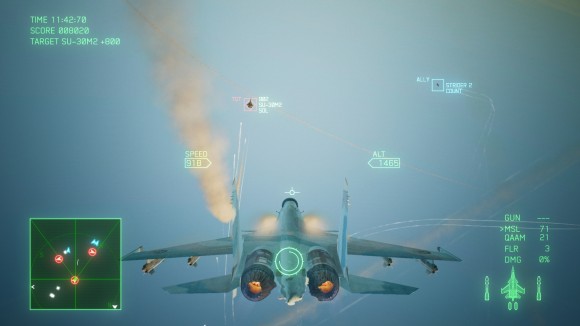
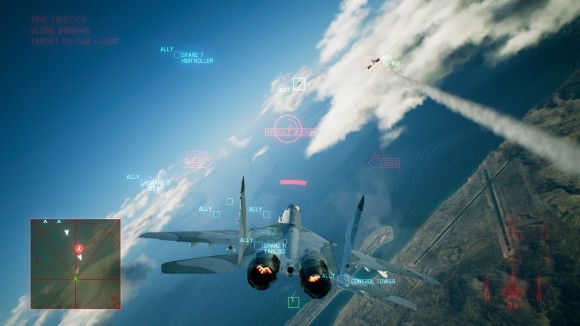
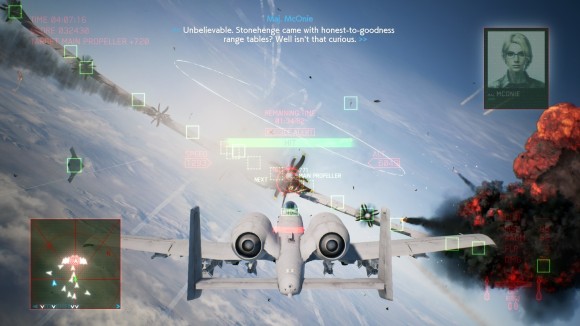
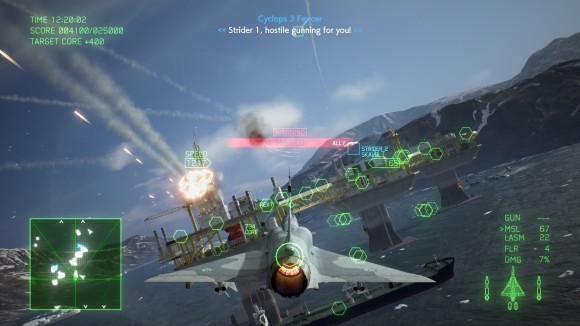
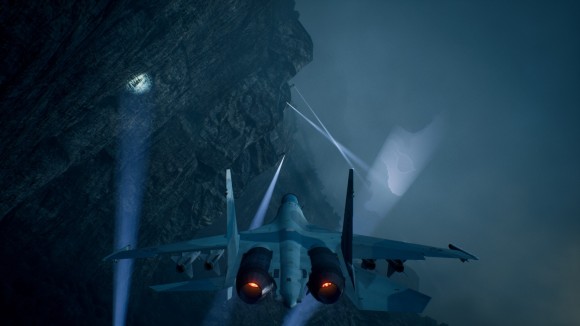
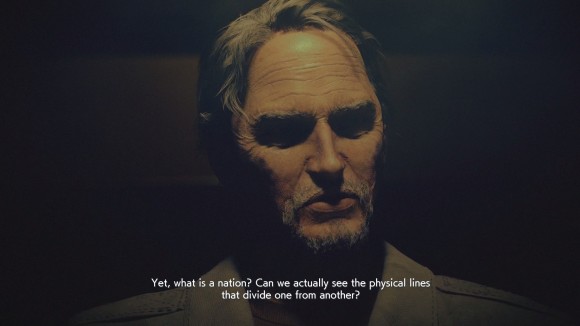
I think AC: Black Flag had an instafail stealth mission where you were tailing a ship with your ship through a swamp or something.
I still think the peak of Ace Combat was Ace Combat 5, which they actually put out in HD as a bonus for AC7 on console. If you can get ahold of it, it might be a better experience. It is certainly the Ace Combat that comes closest to having an engaging, human story instead of weird alt-universe sci-fi that is both banana-pants crazy and deeply boring.
Thx for review, as ever
Curious – - In the Abandonware article you mention you finally got a joystick ; how come you haven’t tried either ace combat or project wingman with it? ????
To be fair, AC7 does have the most tedious campaign of the last few entries. But the previous games are getting pretty old, so…
On another note, isn’t it funny how there are barely any new real planes? AC games from almost 20 years ago already had the F-22 and F-35. Methinks Washington, Moscow and Beijing should put those tax dollars to good use, gamers demand it!